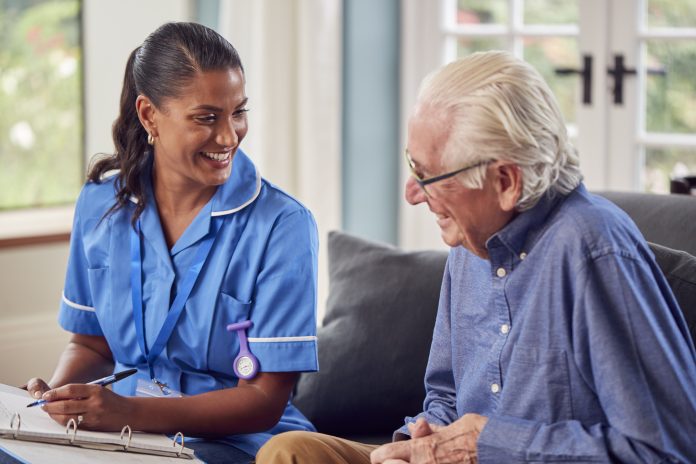We hear from Rhea Horlock, Head of Corporate Social Responsibility at NHS Property Services (NHSPS), who discusses social prescribing & building for health
With increased pressure on primary care, shifting the balance of care to alternative models such as social prescribing is becoming increasingly important for the NHS. But what exactly is social prescribing, and how can the NHS estate be used to facilitate these services? I’ll explain more about this here.
What is social prescribing & why is it important?
Non-clinical interventions have existed under various guises over the years. Social prescribing is one of many models that aim to support both self-care and access to community resources. Social prescribing challenges traditional medical models by viewing patients as active participants in their treatment instead of passive recipients of care. The process sees patients engage with programmes with a community focus that help build up social networks and access to wellbeing services. In practice, primary care professionals refer people to a range of local, non-clinical services to support their health and wellbeing.(1) The activities prescribed are generally provided by voluntary and community sector organisations.
One in five patients consults their GP for primarily social issues, meaning social prescribing has a massive potential to alleviate pressure off primary care. (2) A growing evidence base suggests that community-centred initiatives can be more effective than traditional services in improving the health and wellbeing of marginalised groups and vulnerable individuals. (3) Therefore, social prescribing also can potentially reduce health inequalities in the UK.
Making full use of the NHS estate
The NHS estate plays a critical role in supporting social prescribing initiatives. We strive to maximise this by transforming our portfolio’s vacant indoor and outdoor spaces into vibrant community hubs. These hubs are used by voluntary and community organisations connected to social prescribing networks, helping patients to socialise, learn new skills, and improve their overall wellbeing.
NHS England recently publicised their ‘building for health’ initiative, which sets out the ten building blocks for reducing health inequalities by harnessing the NHS Estate. These include “improving location and access”, “supporting community development”, “improved design” and “access to green spaces”, all of which are key to the way NHSPS approaches social prescribing. By targeting areas of lower-socio economic development, we can tackle health inequalities whilst helping to reduce strains on the NHS.
We actively look for vacant or underused spaces to transform into modern social prescribing sites and wellbeing spaces. Successful examples of turning underutilised spaces into vibrant, community-centred spaces include The Unity Centre in Suffolk. Here we worked with the local ICB to identify the space several community groups are using. Combat2coffee is one of the groups operating out of the centre and was founded by Nigel Seaman, who served in the armed forces for 12 years. The cafe provides rehabilitation, training, and outreach for veterans and other vulnerable people who may be suffering from mental health problems. The centre is an excellent example of the NHS collaborating to use existing space to benefit local communities.
The Mental Health Foundation’s latest report on the importance of good access to outdoor spaces highlights the link between access to green spaces and a reduced risk of mental health. (4) This is why we heavily incorporate green spaces into our plans. A great example is a garden space developed in the Wellington Way Health Centre to create green space to benefit the community. At Wellington Way, the space offers patients the chance to do some exercise through gardening and yoga classes, as well as coffee mornings, mindfulness sessions, toddlers’ groups, art therapy workshops, parent hubs and local community meetings. In bringing these people together, the garden is helping to tackle social isolation.
Building healthier communities
NHSPS have now developed 75 social prescribing sites providing a wide range of community services across the country. Ultimately, social prescribing aims to improve outcomes for people by giving them more choices and control over their lives and an improved sense of belonging through involvement in community groups. It can be beneficial for people who need support with their mental health, have long-term conditions, are lonely or isolated or have complex social needs, particularly targeting the causes of health inequalities. As the NHS continues to navigate this challenging landscape and explore different models of care, the NHS estate can play a significant role in the continued expansion of these services and help to demonstrate the value of, and the need for, social prescribing for local communities.
References
- Buck. D and Ewbank. L. ‘What is Social Prescribing?’, The King’s Fund (2020), Available at: https://www.kingsfund.org.uk/publications/social-prescribing (Accessed: February 2023).
- Torjessen, I. ‘Social prescribing could help alleviate pressure on GPs’, BMJ, 2016, Available at Social prescribing could help alleviate pressure on GPs | The BMJ (Accessed: February 2023).
- Polley M, Chatterjee H, Asthana S, Bertotti M, Cartwright L, Husk K, Burns L, Tierney S. [On behalf of the NASP Academic Partners Collaborative]. (2022). ‘Are there any medium- to long-term outcomes reported for social prescribing and, if so, what are they?’. London: National Academy for Social Prescribing.
- Mental Health Foundation. (2023). Nearby nature and green spaces could benefit the mental health of Londoners | Mental Health Foundation (Accessed: February 2023).

This work is licensed under Creative Commons Attribution-NonCommercial-NoDerivatives 4.0 International.











